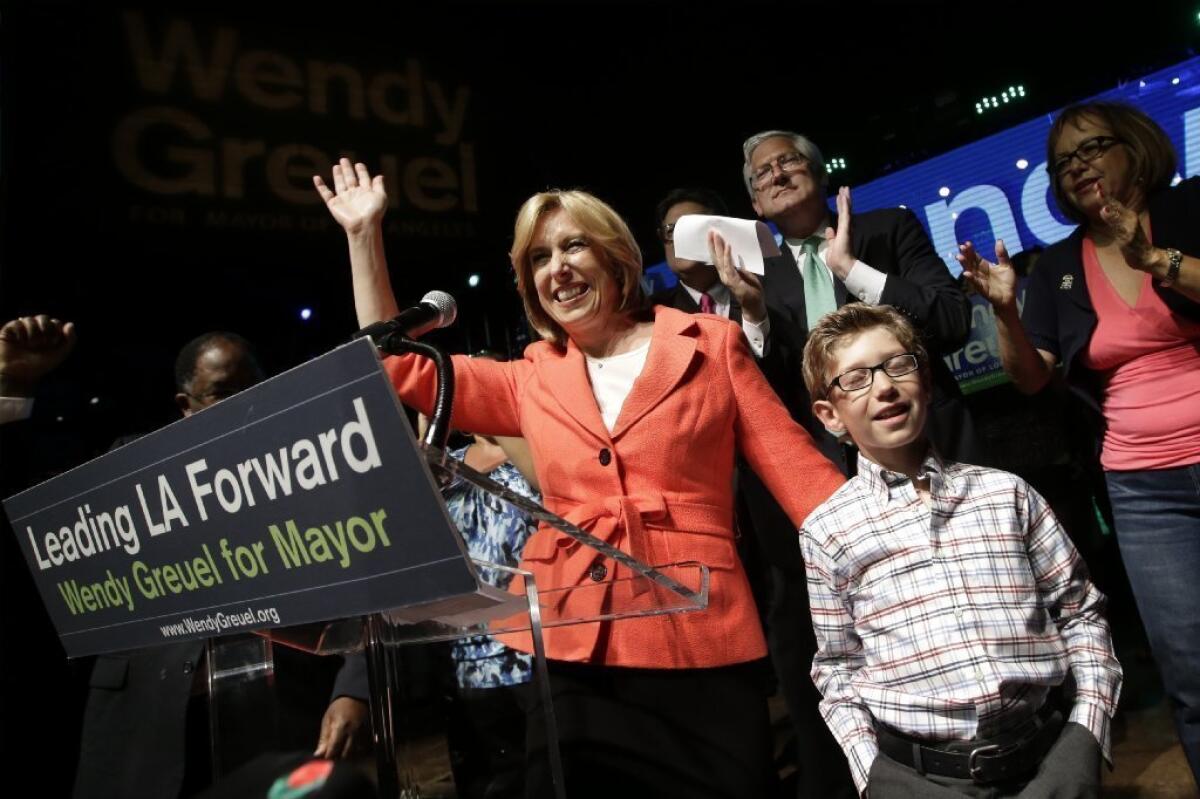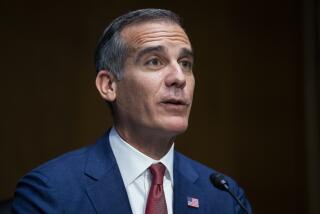Ganging up on Greuel [Blowback]

- Share via
More often than not, columnist Jim Newton gets things right. But his analysis of Controller Wendy Greuel’s campaign for mayor of Los Angeles, which I advised, is dead wrong.
Newton: “Greuel never introduced herself in a positive way to voters.”
Greuel’s first television commercial did precisely what Newton said she did not: It introduced Wendy in a positive way to voters. The ad, “All of L.A.,” featured her speaking directly to the camera as she described her record identifying waste as controller and her plan to create jobs, improve schools and reduce crime for all of Los Angeles. From that point to the end of the March 5 primary, she ran only positive TV ads. In fact, the first ad in the runoff -- featuring supporters Magic Johnson, Sen. Barbara Boxer and former Mayor Dick Riordan -- was 100% positive.
So who went negative first? Beginning Feb. 5, City Councilwoman Jan Perry, a candidate who didn’t make it into the runoff, launched a barrage of smear mailers against Greuel. Councilman Eric Garcetti, now the mayor-elect, joined in a week later. And Kevin James, with funding from a right-wing Texas billionaire, attacked Greuel from the moment he got into the race. All fire was directed at Greuel.
After what The Times called “weeks of relentless attacks,” polls suggested they were beginning to work, and we were at risk of not making the runoff.
To respond, we sent out a mailer titled “Don’t believe Eric Garcetti and Jan Perry’s false attacks.” But like the bad referee who calls a technical on the player who retaliated against a cheap shot, The Times then said the race “took a sharply negative turn.”
Newton: “Greuel never stressed the historic nature of her campaign early.”
Fact: This is the opposite of what happened. There were numerous public events featuring women leaders such as Boxer, House Minority Leader Nancy Pelosi and representatives of Emily’s List and Planned Parenthood making precisely this point.
Newton: “Greuel debated too much.”
And so did Garcetti. The number of debates was ridiculous. But imagine the negative stories had Greuel ducked 47 debates, allowing all of her opponents and the media to attack her empty chair.
Newton: “She overpromised and underperformed.”
Huh? Greuel lost. She did not get an opportunity to deliver on her promises. But at least she put a plan forward, not that The Times noticed. Indeed, she released the 36-page plan, “Leading L.A. Forward,” the most detailed and substantive policy document from any candidate. Yet The Times spilled considerable ink on just one bullet point -- hiring more police officers -- while almost completely ignoring everything else.
Newton: “She spent her money foolishly.”
Greuel emerged from the primary battered by weeks of negative attacks, while Garcetti had been given a free ride from the media and the other candidates during the primary. Not surprisingly, Greuel was down -- by 10 points in a USC Price/Los Angeles Times poll -- and we knew that she could not prevail if she lost absentee voters. Nor would we be able to raise money as long as donors believed Greuel could not win. So we took a calculated risk: We went on TV early to try to change the dynamics of the race. What happened? Greuel surged. Our message worked. Public polling showed her taking the lead. We were in the game.
In response, the Garcetti campaign went 100% negative. We had hoped the momentum from our early ad buy would translate into raising more campaign money, a strategy that has worked for many underdog campaigns. But the money did not come in. Ultimately, had we not spent money early to get back in the race, we would never have had a chance.
Newton: “She let Garcetti make the race into a referendum on unions.”
There were two other groups that made this race a referendum on unions: The Times and the International Brotherhood of Electrical Workers, which represents utility workers in the Los Angeles Department of Water and Power. Greuel had no control over the IBEW’s decision to spend money to support her. Meanwhile, The Times covered almost exclusively process stories about campaign spending by unions.
That’s the real tragedy of this campaign. We could have had a substantive discussion of real issues, a debate about the specific plan Greuel had put forward. Unfortunately, The Times focused instead on union spending. Out of the 188 articles about the race, I counted 61 stories that were negative on Greuel and four that were negative on Garcetti; most were process stories that focused on subjects such as unions or endorsements. Voters never got what they deserved: a referendum on the policy issues facing our city. That’s a shame.
It is easy to Wednesday-morning quarterback campaign strategy. But in this election, The Times was to Eric Garcetti what Fox News was to Mitt Romney.
ALSO:
John McCain: Cable TV, the right way
Immigration bill a testament to compromise
John Shallman, president of the political consulting firm Shallman Communications, was the senior strategist for Wendy Greuel’s mayoral campaign.
If you would like to write a full-length response to a recent Times article, editorial or Op-Ed and would like to participate in Blowback, here are our FAQs and submission policy.
More to Read
A cure for the common opinion
Get thought-provoking perspectives with our weekly newsletter.
You may occasionally receive promotional content from the Los Angeles Times.










